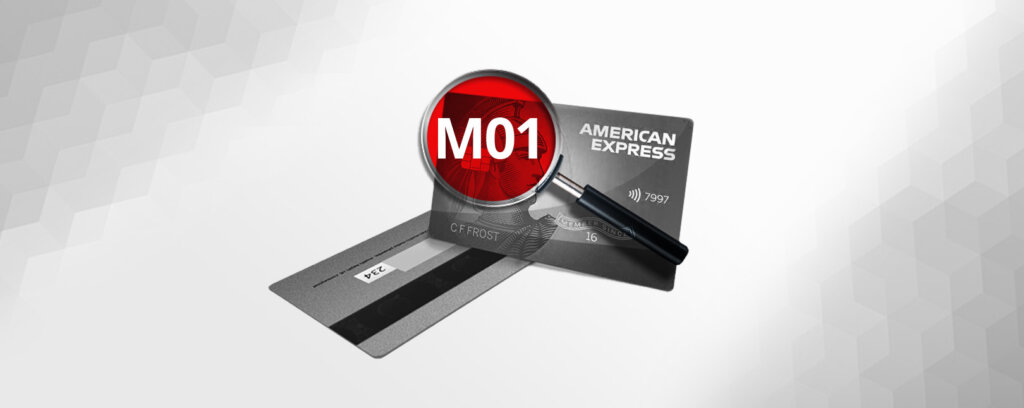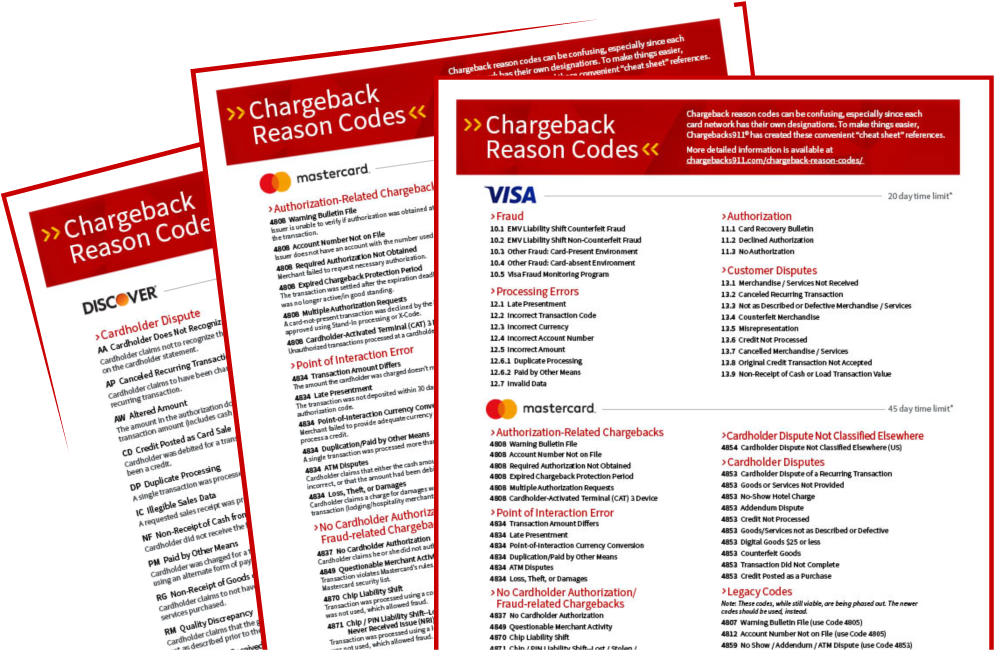
How to Handle Amex Reason Code M01 Chargebacks
American Express breaks down the acceptable causes for a customer to dispute a credit card transaction in their dispute guidelines. This is done for the sake of simplicity and standardization.
Each chargeback trigger has a designated “reason code.” Amex can then assign the appropriate code to each case to show the given reason for the chargeback.
Learn more about Amex reason codes
Today, we’re looking at one reason code in particular — M01 — and exploring the causes, timeframes, fees, and other specifics. We’ll also explore what you can do to prevent these chargebacks from happening.
Recommended reading
- Chargeback Stats: All the Key Dispute Data Points for 2025
- Best Credit Card Processing Companies of 2025 REVEALED
- What Happens When You Dispute a Transaction?
- Spring 2025 Updates to Visa’s Merchant Fee Schedule
- What is Smishing? How to Identify & Prevent SMS Text Scams
- How EMV Chip Cards Work: Pros, Cons, Data Points & More
What is American Express Reason Code M01?
American Express chargeback reason code M01 is “Chargeback Authorization.” This reason code is pretty straightforward. In simple terms, it’s used to explain that Amex has received your authorization to process a chargeback.
For example, let’s say a cardholder disputes a charge, claiming that they made a purchase, but never received the goods in question. Amex reaches out to you for more information, and you look into your records and realize that the customer was right; due to a logistical oversight, you never actually fulfilled their order. So, you submit a response, agreeing that a chargeback is the proper course of action in this case.
What Caused This Dispute?
Amex Chargeback Reason Code M01 is primarily issued when both the bank and the merchant agree that a chargeback should be authorized. American Express submitted an inquiry, asking for more information about a transaction, and you responded with your authorization to process a chargeback for the disputed amount.
You might choose to do this if:
In many cases, you’ll have the option to process a credit to the buyer, rather than a chargeback. In almost all cases, this is a better option, as it allows you to avoid a chargeback fee, and protects your chargeback-to-transaction ratio.

How to Respond to Amex Reason Code M01 Chargebacks
Your options are pretty limited here. After all, the reason code signifies that you’ve already signed-off on providing a credit to the buyer.
However, you can submit a response if you’ve already issued a credit to the buyer as a way of trying to avoid the dispute. In this case, you’ll need to offer proof that you already provided a credit to offset the amount charged. This is done through a process called representment.
Representment is the process through which you’ll challenge a chargeback. You provide evidence to the card issuer (in this case, American Express) that all aspects of the transaction were legitimate and in accordance with the card issuer's policies. This can involve several key pieces of evidence.
Remember that there’s a strict time limit to consider here, though. You have just 20 days in which to submit your response to American Express. This time frame also includes the time it took for your acquirer to provide you with a dispute notification, as well as time spent by the acquirer reviewing and submitting your case. In practical terms, you’ll often have five days or less in which to prepare and submit your response.
How to Prevent Amex Reason Code M01 Chargebacks
As the old adage goes, “an ounce of prevention is worth a pound of cure.”
You may never be able to stop chargebacks entirely. But, you can limit your exposure to risk and keep your chargeback ratio in good standing by adopting a few best practices. Generally speaking, you’ll want to:
#1 | Issue Prompt Refunds
It’s a good idea to keep an eye on your sales, and be prepared to issue refunds promptly when necessary. This will help prevent customers from seeking chargebacks as a way of getting their money back.
#2 | Use Detailed Descriptions & Images
Make sure that all items sold are accurately described and accompanied by high-quality images. Customers should know exactly what they’re purchasing before making a payment.
#3 | Maintain Good Customer Service Practices
Provide excellent customer service at all times. Be available to answer questions, address concerns, or resolve issues quickly and efficiently.
#4 | Keep Accurate Records
Maintain thorough records of all transactions, including proof of delivery for physical goods. This can help you provide evidence if you already provided a credit to your buyer.
Take a Wider View
You can dispute invalid chargebacks from Amex reason code M01. However, it’s much more efficient to take a proactive stance. The same is true of the other chargeback reason codes, as well. A truly effective chargeback management strategy must encompass prevention as well as disputing cases of friendly fraud.
Chargebacks911® can help your business manage all aspects of chargeback reason codes, with proprietary technologies and experience-based expertise. Contact us today for a free ROI analysis to learn how much more you could save.
FAQs
Does Amex investigate chargebacks?
Yes. American Express investigates chargebacks by reviewing the evidence provided by both the merchant and the cardholder to determine the legitimacy of the transaction and decide on the chargeback claim. This process ensures a fair resolution based on the documentation and arguments presented by both parties.
What is the reason code for a chargeback on American Express card?
An American Express chargeback reason code is a code that identifies the specific reason a cardholder or issuing bank has disputed a transaction, guiding the merchant on the nature of the dispute and what evidence may be required to contest it. Each code corresponds to a particular issue, such as unauthorized use, processing errors, or non-receipt of goods or services. Click here to see a full list of Amex reason codes.
Do police investigate chargebacks?
Police typically do not investigate chargebacks as they are considered a dispute between the merchant and the cardholder, handled through the card issuer's internal processes. However, if fraud is suspected as the cause of a chargeback, law enforcement may be involved in investigating the fraudulent activities.
How successful are Amex disputes?
The success of an American Express dispute depends on the merchant's ability to provide compelling evidence that the transaction was valid and in accordance with Amex policies. Success rates vary widely based on the nature of the dispute and the quality of the documentation provided by the merchant.
How does American Express investigate disputes?
American Express investigates disputes by reviewing documentation and evidence provided by both the cardholder and the merchant, such as transaction receipts, proof of delivery, or communication records, to determine the validity of the chargeback claim. This process aims to ensure a fair resolution based on the facts presented by both parties.









